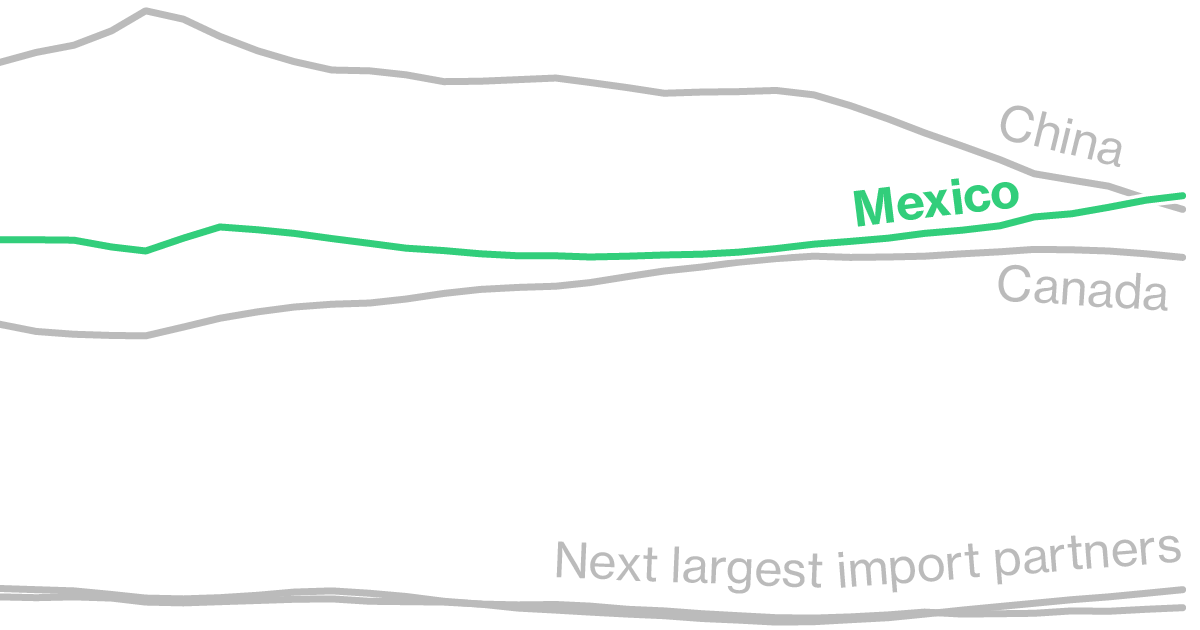The new Cold War is a business opportunity, and Mexico looks better placed than almost any other country to seize it.
US-China tensions are rewiring global trade, as the US seeks to reduce supply-chain reliance on geopolitical rivals and also source imports from closer to home. Mexico appeals on both counts—which is one reason it’s just overtaken China as the biggest supplier of goods to the giant customer next door.
On top of resurgent exports, Mexico boasts the world’s strongest currency this year and one of the best-performing stock markets. Foreign direct investment is already up more than 40% in 2023, even before Tesla Inc. starts building a proposed $5 billion factory. Not since the signing of the North American Free Trade Agreement in the 1990s has the country held the kind of allure for investors that it has right now.
A lot of people expect India to be the country that will displace China as the main manufacturing hub, but Mexico, Bangladesh and Vietnam are actually much better positioned to fill that gap. And there is no reason why a single country should be dominant over a whole industry.
I’ve already seen “made in” labels change from China to Vietnam and other countries. I recently got some Nike gym shirts that were made in Jordan, of all places.
Nike gym shirts that were made in Jordan
There’s a joke about Air Jordans in here somewhere.
India is well positioned for trading services with the west because so many of them speak English.
Removed by mod
Good analysis. Although one thing to note here:
Less Mexicans trying to jump the boarder and enter the US illegally because they can more readily find jobs in Mexico.
The net migration rate of Mexicans coming in and also leaving the US is fairly stable and has been for a couple decades. The main source of inmigrant for the US is Central American countries. But your point still stands that a stronger Mexican economy likely means less immigration to the US from those nations since it would be easier to simply go to Mexico where they speak the language.
Removed by mod
It’s because the US dollar is currently worth 17.14 Mexican pesos, and currently worth (as an example) 7.87 Guatemalan dollars, meaning they are functionally making less money in Mexico.
Keep in mind a lot of these migrants are men who send money home to their families, so exchange rates matter hugely.
deleted by creator
NAFTA was signed by Clinton but began as an idea under Reagan. Bush 41’s team mostly drafted it for America.
Removed by mod
I worked in logistics for a while, so I should add one small caveat:
A lot of that will be stuff that comes from China and is then re-exported. IRC exports from China to Mexico increased something like 30% last year. I’m sure Mexico’s lovely, but I don’t think Mexicans are suddenly buying 30% more Chinese goods.
I saw this often. There’d be tariffs on Chinese products, then suddenly the exact same product would be made in Vietnam, Thailand, or wherever, a country which just happened to not be subject to tariffs. You can’t move a rice field over the border in half a month, so yeah.
Sometimes it was obvious fraud. Stickers over the original stickers.
Sometimes it’d be repackaged or ‘reprocessed’ so it was technically no longer a Chinese product.
but I don’t think Mexicans are suddenly buying 30% more Chinese goods.
I’m afraid you’re wrong with that. Mexico is buying more than ever directly from China retailers. Sales have skyrocketed since pandemic started. Chinese online retailers like Shein, AliExpress, and now Temu are mainly at the top of online retailers charts in Mexico.
Man those tarrifs must be sky high considering how much expense this would add over directly going and that is not even considering mexico wanting a slice of what passes through.
As it should be, neighbors borrowing back and forth makes the most sense. We can use rails to transport and not fuel guzzling ships. Also boasting the economy of neighbouring countries makes the people want to flee less.
I’ve got a feelin’…that republicans will reject it because it relieves an issue they love railing about. Illegal immigrants. It seems their platform is just hating on someone or something
I absolutely hate not having our manufacturing in the US. Whether its China or Mexico, all we are doing is trying to find the biggest sucker to offload work because we as Americans like to spend on frivolous shit for cheap prices. This only contributes to wage disparity and us buying more means more GHG emissions.
I wonder, assuming buying habits are essentially unchanged, does this mean emissions are going to go down (shipping is nearby, no more cross-ocean planes or ships), up (more trucking, meaning smaller loads), or will it roughly cancel out?
I work closely with global transportation, and I can tell you with confidence this means GHGs are going up. Theres something called scope 3 emission factors and sea freight is lower than truck exponentially depending on the distance and weight.
I was afraid of that. I’m guessing that any US-Mexico railways aren’t very useful, assuming they actually exist and are maintained.
Almost all freight from Mexico to the US and vice versa gets offloaded at a warehouse on the border and then switched to a different driver/mode of transportation as having a driver eligible to do the whole trip is hard to come by and expensive.
That being said, the rail ramp in Laredo, TX (the crossing point of Nuevo Leon, MX and the US) is active and widely used. Issue is that rail is slow so if your shipment has any urgency, you just use a truck. I use both and while US rail companies suck to work with, they can be very effective cost wise and help keep our total carbon emissions down. But nothing beats a truck in terms of speed and availability in the US…
Americans like to spend on frivolous shit for cheap prices.
This is the issue. Americans love cheap, low-quality crap. Yet, we complain about manufacturing being off-loaded overseas. If manufacturing moved back to the US and prices rose because of it, Americans would surely be complaining about “inflation” and blame whomever the President happens to be at the time. There’s no winning.
What does it take for people to realize that the people are the problem? Does God himself need to come down from the heavens to say “stop consuming so much guys” for us to get that we buy too much shit we dont need? Do we need inflation to go higher so we just cant buy anything anything?
We are reaching the limits of how much GHGs we can have on this planet before runaway effects and we stand idly because either ‘muh convenience’ or ‘can’t beat em might as well join em’. I think taking steps to reduce freight and move toward local economies begins with us and our spending decisions but its not limited to that.
This only contributes to wage disparity
If modern US factories were forced to be used in producing these low value consumer goods, it would likely to little to help the issue of wage disparity. We look at an offshore factory with 5000 workers and the assumption is on-shoring that work would result in 5000 on-shore jobs, but it wouldn’t. A modern US factory would be highly automated. Perhaps a couple hundred of workers would be the result. Its not nothing, but its not the 5000 most would assume.
They aren’t suckers. They’re making vastly more money working for US companies, and the US companies benefit too. The products are also less expensive which means more people of all income levels have access to them - hugely important for supply chains, especially.
Comparative advantage helps everyone involved.
The U.S. doing business with Mexico over China is great. Some pros I can already think of:
With increased transport using rails, it’d be easier to smuggle shit, therefore you’d think the cartels would be more cooperative. Which means less violence, less turf wars, etc.
Better for the environment. Much less fuel to transport stuff.
If Mexico’s economy improves, a lot of the illegal immigrants that would normally come to the U.S. would probably go to Mexico instead (closer, similar in culture and language).
Pretty much can’t think of a single con, other than prices going up a little bit. It’s worth it.
similar in culture and language
US is a big place, plenty of areas that they can move which the majority speak the same language and have the same culture.
Also as for cartel stuff, if the people are able to make good livings not doing drug stuff then they will. So hopefully their economy keeps improving along with their quality of life.
Honestly, with the way Mexicos leadership/politics and economy is heading, it’s positioned to be a decent power, and potentially be a more desirable location to live than the US sometime in the next century. Big fan of AMLO and hope he is setting them on a good trend. It’s probably only a matter of time before the US intervenes and makes sure they don’t go too far left though, so maybe I shouldn’t get my hopes up.
Hard pass.
Violence is beyond Afghanistan levels. I just came from there. The country is declining rapidly. Truckers are robbed and killed in main highways every day in broad daylight. Hours upon hours of waiting in traffic because cartel blockades or protests against them, with little show of the National Guard. Pollution is horrendous. Small towns seemed abandoned.
Nah.
I hope the US is willing to protect its investments there.
“Sometime in the next century” not right now
Paywalled
It’s Bloomberg anyway, I won’t spend my brain cells reading their version of the story
Balanced portfolio










